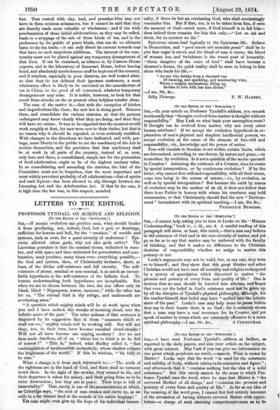[TO THE EDITOR OF THE "SPECTATOR,")
Sin,—In your article on Professor Tyndall's address, you remark incidentallythat "thought evolved from matter is thought without responsibility." May I ask on what basis your assumption rests? If thought can be evolved from matter, why not every other human attribute? If we accept the evolution hypothesis in ex- planation of man's physical and simplest intellectual powers, we accept evolution as the cause of the elements of free-will and responsibility, viz., knowledge and the power of action.
Free-will consists in freedom to act within certain limits, which are determined, according to one theory, by nature and grace,—or to another, by evolUtion. Is it not a question of the modus operandi in Creation? Assuming the existence of a Creator, does he create by special interposition, or by continuous evolution ? If by the latter, why cannotiree-will and responsibility, with all their issues, come into being in the course of nature,—i.e., by evolution, as well as by special interposition ? But because the earth by means of evolution may be the mother of us all, it does not follow that there is no Father in heaven with whom his creatures may hold communion, or that Christianity should find the new " Environ. ment " inconsistent with its spiritual teaching.—I am, Sir, &c., FREDERICK BURGESS.






























 Previous page
Previous page